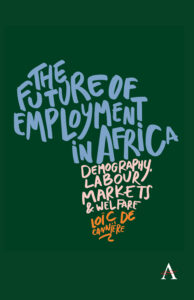This is a guest post by Loic De Canniere, author of The Future of Employment in Africa: Demography, Labour Markets and Welfare
In 2025, eleven of the world’s twenty fastest-growing economies are in sub-Saharan Africa – including South Sudan and Senegal, which both rank in the top five. Since 2010, Africa’s representation among high-growth economies has steadily increased, with countries such as Ethiopia, Rwanda, Ghana and Tanzania often leading the pack. Yet, this positive narrative about Africa is rarely highlighted.
These findings come from the International Monetary Fund’s (IMF) Regional Economic Outlook for Sub-Saharan Africa (April 2025), which paints an encouraging picture. In 2024, the region’s economic activity grew by 4%, surpassing expectations. Inflation has eased, public debt has stabilised and is beginning to decline, and external balances have improved thanks to higher commodity prices (notably gold, cocoa and coffee) and more stable exchange rates.
The IMF forecasts GDP growth of 3.8% in 2025 and 4.2% in 2026 for sub-Saharan Africa – outpacing the global outlook of 2.8% and 2.9%, respectively. The region is clearly on a recovery path after enduring four years of external shocks, including the COVID-19 pandemic and the war in Ukraine (causing higher food prices). However, new global economic disruptions threaten to interrupt that recovery once again.
Compounding the challenge is a global environment marked by rising trade tensions. Many African governments are under pressure due to their heavy reliance on official development assistance – with roughly a quarter each coming from the United States and the European Union. The future of these financial flows beyond 2025 remains uncertain. Regional conflicts, such as those in Sudan and eastern Congo, and the escalating frequency of climate-related disasters, add further obstacles.
Despite notable progress, poverty remains widespread: nearly one-third of sub-Saharan Africa’s population lives on less than $2.15 a day. Over 140 million people – around 12% of the population – suffer from severe food insecurity.
Nonetheless, the IMF remains optimistic. With abundant natural resources and a rapidly growing labour force, sub-Saharan Africa has the potential to become one of the world’s most dynamic and influential markets. But realising that potential requires improved governance, a stronger business climate, investments in human capital and robust infrastructure development.
The IMF emphasises the urgent need to create millions of quality jobs to keep pace with the rapidly expanding workforce. It advocates for lowering barriers to formal sector growth while also boosting productivity in the informal economy. These recommendations align closely with the arguments in my book, The Future of Employment in Africa: Demography, Labour Markets and Welfare.
It is particularly noteworthy that the IMF now acknowledges the critical role of the informal sector. In the 1970s and 1980s, the Fund often ignored or marginalised the informal economy in its analysis and policies. Its Structural Adjustment Programs – characterised by austerity, deregulation and privatisation – frequently worsened informality. At the time, informality was viewed as a temporary side effect of underdevelopment, expected to vanish as economies grew. Today, the IMF takes a far more realistic view: with 20 million new labour market entrants in Africa each year, both the formal and informal sectors must expand to avoid mass unemployment and deepening poverty.
This shift in perspective may help explain recent criticism of the IMF from U.S. Treasury Secretary Scott Bessent, who argued the Fund is suffering from ‘mission creep’. But such evolution may be precisely what is needed to address the realities on the ground.
As the IMF report concludes, ‘A strong, stable, and prosperous Africa is good for the world. And through four years of crisis, the region’s perseverance has been notable. (…) But sub-Saharan Africa’s broader prosperity is far from guaranteed and will depend in part on continued external support’.
The upcoming G20 Summit in Johannesburg offers a crucial opportunity to amplify this message. But the success of that summit – and of Africa’s development – depends on whether the global community is truly willing to commit to multilateral cooperation.

